News from ProDentures
Your Source for Affordable Partial & New Dentures in Houston, Texas

Much like your natural teeth, partial dentures require daily cleaning to keep them in good condition. Debris that accumulate on real teeth, such as dental plaque, bacteria, tartar, stain and food particles affect dentures the same way. This doesn’t mean, however, that you should care for dentures as you would your natural teeth. Effective denture maintenance calls for some changes to your usual oral care routine. The following are things your dentist in Houston might advise you not to do to preserve the quality of your new partials.
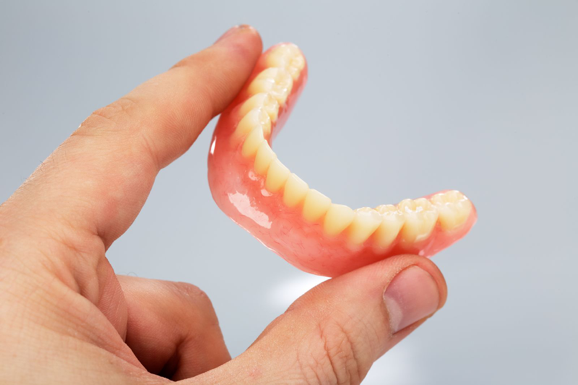
If you’re wearing dentures for the first time, you may notice that food you used to find savory and flavorful may not be as tasty. This is no cause for alarm, however, since many first-time denture wearers report experiencing some loss of taste. Although most of your taste buds are located near the tip and around the edges of your tongue, a significant few can also be found in the roof of your mouth. If you’re wearing full and upper dentures that cover the palate, for example, you will likely experience a decline in your sense of taste.

Losing any of your teeth is one of the most dreaded natural changes in an aging person’s life. It can have some serious consequences, such as difficulty in eating and speaking. If neglected, the remaining teeth will begin to shift toward the empty gums, further creating problems and the risk of infection in the mouth. Thanks to dentures, missing teeth can now be replaced to restore both the appearance and functionality of your mouth.

Partial dentures are great tooth replacement options, but getting used to them can take a while. While dentists affordable partial dentures are custom made to fit properly and comfortably in your mouth, your dentures may still need to be adjusted to your preference.
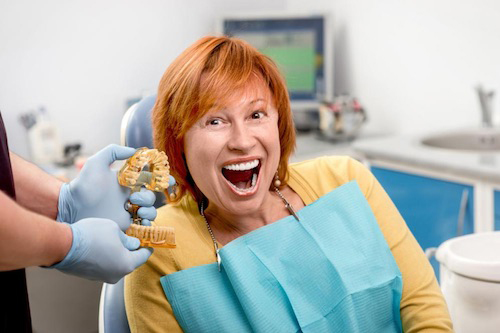
Depending on the material used for their construction, partial dentures can last a minimum of five years. For instance, 50 percent of denture wearers with cast partials were found to be still wearing their appliances 10 years after they first put it on. Studies have revealed, meanwhile, that acrylic partials have an expected lifespan of 1 year or more. For the most part, therefore, partial dentures are temporary solutions since your mouth can still undergo changes, affecting the fit of the appliance.
However, dental patients should remember that maintenance also plays a big role in denture longevity. How you keep up with good oral care on a daily basis can determine just how many years of use you can get out of a set of new dentures.
Poor Oral Care
Brushing and flossing may be enough for natural teeth, but dentures need more substantial care. For instance, you need to use denture cleansers and toothpastes ideally bearing the American Dental Association (ADA) Seal of Acceptance.
These are proven to be effective at cleaning without being too abrasive. You should also avoid using brushes with hard bristles to remove and rinse food particles as they can damage the dentures or cause it to lose its shape. Lastly, soak the dentures in a solution like Polident or warm water so the denture are kept moist at night.
Lack of Repair
Partial dentures need to be routinely examined by your dentist to see if it needs repair of adjustment. It is normal for partial dentures to have some signs of wear and tear the longer you wear them.
Worn aspects of the appliance must be replaced or repaired by qualified professionals only. The Good News is the ProDentures is often able to repair your dentures in our in-house lab.
Sometimes, full replacement of the entire prosthesis is required in order to adapt to the current situation of the patient. Usually, experiencing signs of discomfort, such as irritated tissues, headaches, ear aches, neck pain, difficulty chewing and digestive problems are the most common indications to visit a denture dental clinic like ProDentures.
Ignoring Stains
While observing proper oral care can prevent most extrinsic damage, it is still normal to notice some staining occurring on your dentures over the years.
The good news is that it’s not a permanent change.
Only your dentist can polish your dentures with specialized tools and equipment, restoring its natural sheen. Stains will be removed to give your dentures a fresher, cleaner look. Over-the-counter teeth whiteners will just cause irreparable damage, so refrain from doing any kind of DIY alteration to your oral appliances.
Ideal denture care should be a joint effort between you and your dentist. If you are in need of more complicated repairs, don’t hesitate to drop by ProDentures in Houston and let us provide a thorough evaluation.
Sources:

Aging triggers various changes to your body. One that has a particularly immense effect on your life is tooth loss. When you reach your senior years, you will notice your teeth beginning to come loose or even begin to fall out, especially if the underlying gums are compromised.
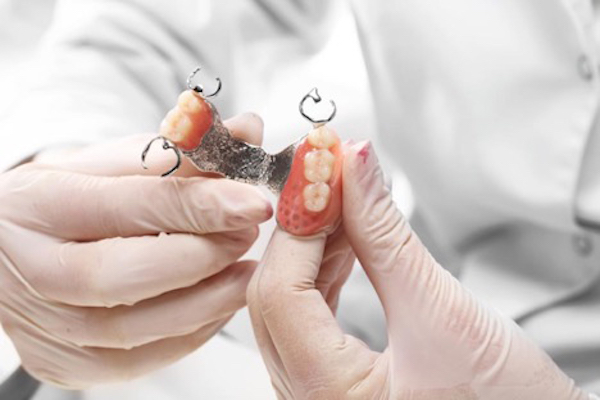
Partial dentures are indispensable for those who are suffering from a few missing teeth.
Routine care and maintenance are required to ensure that your partial dentures stay in great condition so they will last longer. However, nothing lasts forever.
There will come a time when you’ll need your local Houston dentist to craft replacement partial dentures for you. The key is knowing when you should go see an elder dentist who caters to older folks.
With that in mind, here are four tell-tale signs that it’s the best time to see your dentist to discuss having new partial dentures made:
Cracks, Chips, and Other Forms of Damage
From accidentally biting down on a bone while eating to accidentally dropping your partial dentures while cleaning, there are many instances where partial dentures may sustain damage.
Just as you would if your natural teeth sustain a crack or chip, make sure you see a trusted dentist with ProDentures as soon as possible if your dentures sustain damage. Even the smallest chip can lead to unbalanced pressure when chewing or speaking, which may damage neighboring teeth.
Partial Dentures Seem to Becoming Loose
Over time, the jaw bone will actually lose density and begin to shift. You may not notice this immediately, but you may begin to notice that your dentures seem to feel loose all of a sudden.
When this happens, be sure to see your dentist as soon as possible. Your dentist can easily make the necessary adjustments to your partial dentures and ensure they fit properly, helping you avoid the embarrassment of partial denture falling out while speaking and prevent the development of sores along the gums.
Gums Have Become Swollen
Gum irritation is common when wearing new dentures for the first time, but this should subside after a few days or weeks. However, gum irritation to the point of causing your gums to become inflamed or cause gum bleeding is a cause for concern.
This often means that the surface of the partial dentures has sustained some form of damage and is now irritating the gums. This issue can easily be resolved by asking your dentist to fashion you a new set of partials for you.
Your Current Dentures Are More Than 5 Years Old
Dentures go through a lot over the course of their lifetime thanks to the pressure exerted while speaking and chewing. As such, it isn’t uncommon to see wear and tear at some point.
If your current set of partial dentures are more than five years old, pay your dentist a visit and have him assess the condition of your dentures and whether or not you’ll need to have a new set made.
When it comes to your dentures, you should never settle for anything less than a set prepared by a trusted doctor with ProDentures. We offer partial dentures with outstanding long-term warranties.
Sources:
Removable Partial Dentures, MouthHealthy.org
8 Signs You Might Need Dentures, Prevention.com

People who are missing more than a few teeth often choose to have a trusted dentist create a new set of high quality dentures.
After all, modern technology and revamped techniques have allowed dentures to look and function nearly as well as natural teeth, making affordable new dentures a fantastic option for most people, especially older adults and those on a limited or fixed income.
If this is the first time you’ll be wearing dentures, however, they may feel a little awkward in the beginning. This is not uncommon since everyone requires a period of adjustment when wearing dentures for the first time.
Fortunately, there are many ways to help you adjust to your new dentures much faster.
Some of these ways include:
Talk to Your Dentist About Adhesives
The adhesive you use will play an important role in how well you adjust to your new dentures since dentures need to adequately anchored to the gumline. Talk to your dentist and ask about which types of adhesives he or she recommends.
A respected dentist will offer you suggestions that have worked for other patients. However, everyone is different, so be sure to experiment to find one that works best for you.
Practice Eating at Home
One of the more difficult things to do when wearing dentures for the first time would be chewing food. Keep in mind that “practice makes perfect”.
It would be best to get used to how your dentures fit and feel as you chew different types of food. Try to draft a menu with a diverse range of textures at home for the first week or so to help you get better acquainted with how your dentures respond to your chewing motions.
Sing Your Favorite Tunes
Some people find that speaking with dentures restricts the movement of the tongue, making it difficult to pronounce certain syllables properly.
A good way to practice speaking better is to sing along to your favorite songs while wearing your new dentures. Singing has long been used a form of speech therapy. At first, try singing along to slower songs and work on making sure the lyrics come out smoothly.
Have Your New Dentures Adjusted
Lastly, it is common to revisit the dentist to make minor adjustments as your bones begin to heal.
Pay close attention to how your dentures fit in your mouth. Slight discomfort in the first few days is natural, but if the dentures feel too tight or too loose after a few days, you may need to ask your dentist for an adjustment before your next visit.
ProDentures is the place for affordable new dentures in Houston, Texas. Give us a call today at 832-688-9726 to arrange a free, no-hassle on-on-one consultation with one of our experienced dentists.
Sources:
Five Tips For Getting Used To Dentures, colgate.com
Dentures FAQs, gotoapro.org
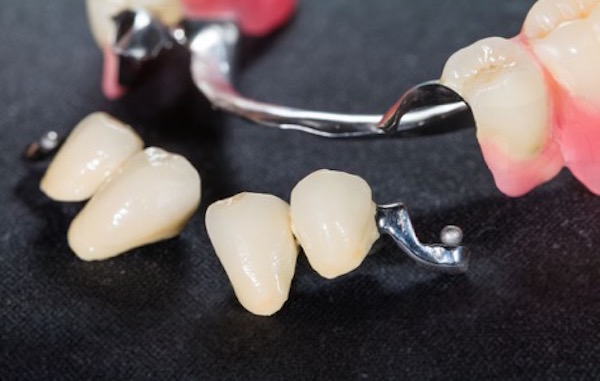
Partial dentures are much more affordable solution to more expensive dental implants. However, mishandling them may lead to damage all the same. Fortunately, there are many steps you can take to ensure your partial dentures last for years to come.
With that in mind, you may want to try the following maintenance tips:
Skip the Use of Toothpaste
Although today’s partial dentures look and function amazingly like natural teeth, it does not mean that you can clean them as if they were natural teeth. Typical toothpastes are too abrasive for the material used to craft partial dentures and may lead to damage. When cleaning affordable partial dentures, it’s best to use the warm water and a mild soap or a cleaning solution your dentist recommends.
Protect Your Dentures with a Thick, Soft Towel
Most people with dentures prefer to do so over the bathroom sink for the sake of convenience. In such cases, you should definitely place a thick and soft towel underneath your dentures as you clean them.
Partial dentures are designed to withstand the pressure exerted when biting, but they can easily chip or shatter when they fall on a hard surface like a countertop or the sink. Placing a towel underneath will help cushion the impact if your dentures slip through your fingers.
Leave Them to Soak While Sleeping
It is not advisable to go to bed while wearing partial dentures. However, this does not mean that you can just leave them lying on top of your bedside table. Partial dentures should be placed in soaking solution or clean water overnight to prevent them from drying out and warping.
This should also help minimize the chances of your partial dentures accidentally falling onto the floor in the middle of the night. Make sure, though, that you rinse out your dentures properly before putting them back on the next day.
If you notice that your dentures no longer fit easily…
Generally, your partial dentures should slide into place fairly easily, but it isn’t uncommon to find that your partial dentures no longer slide into place properly.
This is because some of your teeth and underlying bone structure may have started to shift. In such cases, never try to force them in as you can damage the dentures or even your teeth/gums. Instead, be sure to see a trusted dentist with ProDentures, and ask about the possibility having your dentures adjusted.
Of course, we are also able to repair or reline dentures as well. Give us a call today 1-800-776-3368.
Sources:
Removable Partial Dentures, mouthhealthy.org
Taking Care Of A Partial Denture, colgate.com
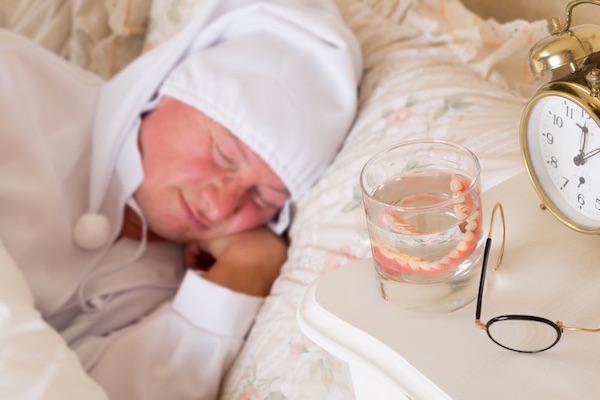
Although millions of people rely on replacement dentures to regain the functionality of their mouth, the American College of Prosthodontists strongly recommends patients to take out their partial dentures before they sleep. Dental professionals say that doing so will give the gums and bone a much needed break from the pressure of supporting dentures throughout the day. As any experienced dentist will tell you, however, not wearing dentures at night has more hygienic and health benefits than you might think.
Here are some good reasons to think twice about leaving your dentures on at bedtime…
Denture-Related Stomatitis
It is normal for salivary flow to be reduced while you sleep, causing your mouth to feel a little dry. Wearing dentures at night further inhibits the flow of saliva in your mouth, leading to a condition referred to as stomatitis (inflammation of mouth and lips).
Denture-related stomatitis affects the gum tissue underneath, like the palate, causing it to take on a reddened appearance. Once this inflammation sets in, you are more likely to get an infection caused by yeast and other types of bacteria. From there, you might also be at risk of developing cheilitis or cracking around the corners of the mouth, which may then also be infected by the same bacteria.
Pneumonia in the Elderly
Researchers in Japan have found a connection between wearing dentures during sleep and risk for pneumonia. The study was conducted over a period of three years and involved 524 randomly selected seniors with an average age of 87.8.
Empirical evidence suggested that denture wearing at night is not only associated with oral inflammation and bacteria growth, but with the potential to develop pneumonia as well.
As it turns out, wearing dentures 24 hours a day, without practicing proper oral hygiene, makes your mouth more susceptible to bacteria that can then be inhaled into the lungs. Combined with the difficulty of swallowing saliva with dentures on, older folks are more susceptible to contracting pneumonia and other chest infections.
Accelerated Bone Resorption
Bone loss is a common problem as one gets older, and wearing dentures the entire day may further accelerate the rate of resorption. The pressure of constantly wearing dentures wears down the gums and the bone beneath becomes more brittle.
As a result, the jaw loses its shape, causing your dentures to not fit properly. It can also alter your physical appearance, facial bone structure, and facial expressions. Resorption might also increase the likelihood of embarrassing slippages, and could even limit the foods you can eat.
Dentures or partial dentures are effective at restoring your smile only if you use and maintain them according to your dentist’s instructions.
The next time you visit us at one of the ProDentures offices, don’t hesitate to ask us about other ways to maintain good oral health.
